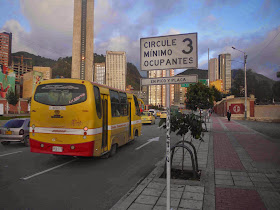 |
| Traffic congestion: the solutionless city? |
 |
| El Tiempo - a vehicle for selling cars. |
'What Bogotá is not doing to escape its traffic jams.' (The online version's headline gives a more positive spin than the print edition.)
 |
| Needed in Bogotá: More cars. The rate of car ownership is skyrocketing. |
 |
| Building the car culture: A university's massive parking lot under construction in Bogotá's Eastern Hills. |
Charging vehicles for causing congestion: A decree creating a congestion charge, based on two studies by international firms, was junked by the City Council recently with no good justification.
Charging for on-street parking: As it is, vehicles park on the street - and on the sidewalk - for free. The city should also ban the destructive practice of providing free parking to customers and employees, which is a huge incentive and subsidy for the use of private vehicles - and a subsidy for the wealthy.
 |
| Congestion by the gallon: gasoline prices are an obsession here. |
shopping/hotel/office will have huge impacts on this already chaotic and congested intersection. Is the city taking any measures to deal with this? I haven't seen them. In a rationally-run city, the building owner would have to pay for compensatory transit improvements, such as a TransMilenio line up Calle 19 or a light rail line on Carrera 7.
 |
| Three's not a crowd: Mayor Petro's transit policy has been limited to this failed car-sharing rule. |
 |
| The city regulates parking lot fees. Why not let supply and demand work, like it does elsewhere? |
Above La Candelaria the Externado University is building two monstrous towers consisting mostly of parking lots. The minimal public discussion about this project has involved its legality, which is dubious. But little has been said about whether or not deforesting the city's hills in order to generate more pollution and traffic congestion is good for the city and should be permitted.
Creating a public bicycle system: Bogotá, which used to be a regional bicycle pioneer, has talked for years about creating a public bicycles system, and even held a pilot project, but never put the idea into practice. The city does lend bicycles, but only for use on specific streets.
And so on...
Instead, Bogotá culture promotes driving and car ownership. Ironically, the same Wednesday edition of El Tiempo also contained a slick magazine called 'Motor' glorifying car ownership.
And the media maintains a constant drumbeat about the importance of lowering parking fees and the price of gasoline. Today's El Tiempo also reported that 'The City Council denounced that in the past four years Bogotanos have paid 720,000 million more than authorized for parking fees.'
In fact, car owners have rather received much more than that in subsidies via free parking. And, why are the prices of parking and gasoline regulated by the government, in any case - in contrast to more socially positive things such as bread and books? Isn't charging what the market will bear called capitalism and freedom of competition?
By Mike Ceaser, of Bogotá Bike Tours
And so on...
Instead, Bogotá culture promotes driving and car ownership. Ironically, the same Wednesday edition of El Tiempo also contained a slick magazine called 'Motor' glorifying car ownership.
 |
| Bogotá's public bicycle program is limited to a few streets and not very practical for transport. |
In fact, car owners have rather received much more than that in subsidies via free parking. And, why are the prices of parking and gasoline regulated by the government, in any case - in contrast to more socially positive things such as bread and books? Isn't charging what the market will bear called capitalism and freedom of competition?
By Mike Ceaser, of Bogotá Bike Tours
Wait... did I read that right? Bogota regulates parking? They are promoting driving? Yes you are correct, they should make it be a free market and make the prices go insane. That is one of the contributing factors that pushes for more use of public transportation in San Francisco.
ReplyDeleteI don't know though. Transmilenio is hard to argue for, since when you are taking it, you are literally hugging the person next to you at times. And SiTP is not quite easy to access considering everyone likes to pay efectivo.
Hi Chief,
ReplyDeleteThanks for your comment. Making parking prices a free market wouldn't cause prices to skyrocket anymore than a free market in bananas has caused their prices to skyrocket. With parking lots on every other block, there's lots of competition.
No transport system is ideal, but the very fact that TransMilenio is sometimes crowded shows that it's successful.
San Francisco, California is using flex pricing for parking public areas. Prices change with demand to keep the same car from using a space all day long. In Bogota, of course, drivers park on many public spaces for free, stimulating and subsidizing driving.
Mike